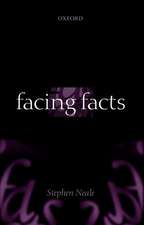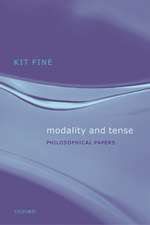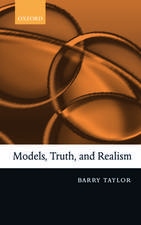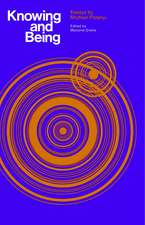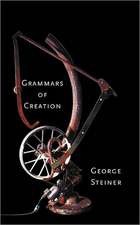Badiou and Indifferent Being: A Critical Introduction to Being and Event
Autor Dr William Watkinen Limba Engleză Paperback – 20 sep 2017
| Toate formatele și edițiile | Preț | Express |
|---|---|---|
| Paperback (1) | 180.88 lei 3-5 săpt. | |
| Bloomsbury Publishing – 20 sep 2017 | 180.88 lei 3-5 săpt. | |
| Hardback (1) | 541.28 lei 6-8 săpt. | |
| Bloomsbury Publishing – 20 sep 2017 | 541.28 lei 6-8 săpt. |
Preț: 180.88 lei
Preț vechi: 208.89 lei
-13% Nou
Puncte Express: 271
Preț estimativ în valută:
34.62€ • 35.86$ • 28.89£
34.62€ • 35.86$ • 28.89£
Carte disponibilă
Livrare economică 01-15 martie
Preluare comenzi: 021 569.72.76
Specificații
ISBN-13: 9781350015678
ISBN-10: 1350015679
Pagini: 296
Dimensiuni: 156 x 234 x 29 mm
Greutate: 0.45 kg
Editura: Bloomsbury Publishing
Colecția Bloomsbury Academic
Locul publicării:London, United Kingdom
ISBN-10: 1350015679
Pagini: 296
Dimensiuni: 156 x 234 x 29 mm
Greutate: 0.45 kg
Editura: Bloomsbury Publishing
Colecția Bloomsbury Academic
Locul publicării:London, United Kingdom
Caracteristici
Badiou's work Being and Event is doubtless one of the most important philosophy books published in the last 30 to 40 years. A commentary of this depth and originality will be indispensable to Badiou scholars.
Notă biografică
William Watkin is Professor of Contemporary Literature and Philosophy at Brunel University, UK.
Cuprins
prefaceacknowledgementsIntroduction:Subtractive Being; Nonrelationality; Indifference; Set Theory; Retroactive Axiomatic Reasoning; Transmissibility, Intelligibility and Communicability; Theory of the SubjectChapter One: Being: The One and the MultipleHow to Prove that the One Is-Not (Meditation One); The One as Operational Counts-as-One; The Ancient Problem of Classes; Situations and Structures; The Multiple; Presentation of Presentation; Reasoning on Being by Means of Axioms; How to Accept that Being Is-NotChapter Two: Being: Separation, Void, MarkMeditation Two; Set Theory and Aggregation as Collection (Meditation Three); Axiom of Separation; Notation and Self-Predication; The Pure Multiple is Real; The Void: Proper Name of Being (Meditation Four); The Void and Nothing; Void as Nomination; ZF+C: The Nine Axioms of Contemporary Set Theory (Meditation 5); Axiom of Extensionality; Axiom of Replacement or Substitution; The Void Set and In-Difference; Meditation Six: Aristotle; Conclusion: Pure Multiple and the VoidChapter Three: Being and ExcessPowerset Axiom (Meditation Seven); Point of Excess; Void as Name; Four Kinds of One-ness: One, Count-as-one, Unicity, forming-into-one; The State (Meditation Eight); Threat of the Void; Belonging, Inclusion and Parts; Typologies of Being; States and Indifference (Meditation Nine)Chapter Four: Nature and InfinityNature is Normal (Meditation Eleven); Transitive Sets: Cardinal and Ordinal (Meditation Twelve); Nature and Minimality; Nature and Intrication; The Inexistence of Nature; Potential and Actual Infinity; Proving the Actual Infinite; Doubling and Dedekind Infinites; Frege and EquinumerosityChapter Five: Infinity, Limit and SuccessionThe Limit; Succession and Limit; The Upper or Maximal Limit; Succession; Infinite Thought: Problems of Procedure (Meditation Thirteen); In-Different Other: The Second Existential Seal; There is some infinity in natural multiples (Meditation Fourteen); Conclusion on BeingChapter Six: The Event: History and Ultra-OneHistorical Singularities (Meditation Sixteen); Historical Singularities, and Evental Sites: Examples; Primal Ones and the Edge of the Void; Singularity vs. Normality; Self-Predication: The Matheme of the Event (Meditation Seventeen); The Problem of Naming; Axiom of Foundation (Meditation Eighteen); Implications of Foundation; Coda: Un-RelationChapter Seven: The Event, Intervention and FidelityThe Wager: yes or no (Meditation Twenty); Intervention; Seven Consequences of the Event; Axiom of Choice (Meditation Twenty Two); Choice is Indifferent; Due to Choice, Singularities Exist and they are Indifferent; Fidelity, Connection (Meditation Twenty Three)Chapter Eight: The GenericContinuum Hypothesis: (Meditation Twenty-Seven); The Thought of the Generic (Meditation Thirty-One); Truth and Knowledge: The Indifference of Avoidance; Generic Procedure; The Matheme of the Indiscernible (Meditation Thirty-Three); Easton's Theorem (Meditation Twenty-Six); Conditioning the Indiscernible; Indiscernible or Generic Subsets; The Existence of the Indiscernible (Meditation Thirty-Four); Extension; Is there a name for the discernible such that it can be said to exist?Chapter Nine: Forcing: Truth and SubjectTheory of the Subject (Meditation Thirty-Five); Subjectivization; Chance; Faith; Names; Forcing (Mediation Thirty-Six); Leibniz's Identity of Indiscernibles (Meditation Thirty); The Proof of Forcing (Meditation Thirty-Six); From the Indiscernible to the Undecidable; Conclusion (Meditation Thirty-Seven);bibliographyindex
Recenzii
A remarkable achievement and a distinctive contribution to our knowledge of Badiou's thought. For all the skill, and sometimes brilliance, of previous explications, no-one had quite captured the tenor, the character or (a heretical word, perhaps) the feel of Badiou's ontology; not, at least, in language.
Watkin's is a very important book. Much of the commentary on Badiou has tended to move his politics to the centre of his thought. With meticulousness, clarity and rigour, Watkin works rather through Badiou's philosophization of mathematics, liberating the philosopher qua philosopher, the thinker whose awesome achievement has been to recast and transform our understanding of a major set of traditional philosophical terms. This book returns us to what is most gripping about Badiou, his stark, courageous and deeply uncontemporary asceticism.
Watkin's is a very important book. Much of the commentary on Badiou has tended to move his politics to the centre of his thought. With meticulousness, clarity and rigour, Watkin works rather through Badiou's philosophization of mathematics, liberating the philosopher qua philosopher, the thinker whose awesome achievement has been to recast and transform our understanding of a major set of traditional philosophical terms. This book returns us to what is most gripping about Badiou, his stark, courageous and deeply uncontemporary asceticism.






